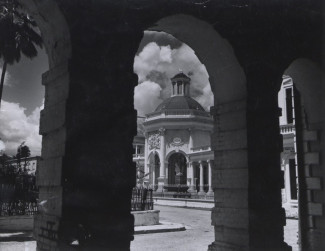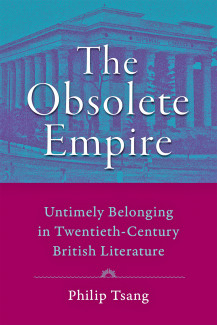
Johns Hopkins UniversityEst. 1876
America’s First Research University
Does empire have an expiry date?

By Philip Tsang

In December 2020, BBC released a radio documentary about Dorothy Bonarjee. Born into a Bengali Christian family in India in 1894, Bonarjee was sent to London for school at the age of ten. She later enrolled in the University College of Wales and won a major literary prize there. After her time in Wales, she returned to London to undertake further studies, becoming the first woman to receive a law degree from University College London. Unlike her brothers, who went back to India, she remained in Europe and lived the rest of her life in exile.
When I came across this documentary last year, I had just sent JHUP the final manuscript of my book The Obsolete Empire. What struck me about Bonarjee was how familiar her story is. When we look at the history of the British empire, we find countless stories of English-educated colonials who, caught between two cultures, never seemed to belong anywhere. These stories of empire-induced displacement are the core subject of my book.
More specifically, my book traces an aesthetic of frustrated attachment that shaped the literary landscape of the twentieth century. In literary studies, “attachment” is hardly the first word that springs to mind when it comes to empire. Instead, we are more accustomed to critiques of imperialism. Over the past few decades, we have developed sophisticated tools to deconstruct imperial ideologies and discourses. But while questions of anti-colonial resistance have rightly framed our discussion of the British empire and its legacy, I wanted to examine more closely the affective texture of empire through the lens of desire and attachment. I wanted not only to demonstrate the presence of imperial attachments, but to ask what happens when those attachments remain unrequited.
My book begins with a simple premise: For people who were molded in imperial structures and institutions, they harbored a deep identification with British culture regardless of their views on empire. What does it mean to grow up in the shadow of a distant country that governs one’s life and education? One writer whose trajectory resembles Dorothy Bonarjee’s is Nirad Chaudhuri. His Autobiography of an Unknown Indian is a central text in my introductory chapter. Literary critics have not been kind to Chaudhuri, often dismissing him as an “Anglophile.” But that label is reductive because it posits him as an uncritical receiver of English culture; it fails to account for the perennial restlessness in his writing. Writers like Chaudhuri are never comfortable with their own attachment to England. Rather, England appears as the wrong object of desire. Yet in an unlikely way, this self-consciously misplaced attachment—this unresolved complex of desire and shame—also becomes for them a rich source of intellectual energy.
Chaudhuri’s Autobiography was published in 1951—four years after India gained independence. He thus belongs to a generation of writers who grew up as British subjects but witnessed the termination of imperial rule. These writers share a preoccupation with the curious relationship between empire and time. “Sometimes I feel I was the last colonial,” writes Stuart Hall in his memoir Familiar Stranger. Technically speaking, there is no last colonial because Britain continues to have overseas territories to this day. But Hall does articulate a common feeling among late colonial writers—a sense of finding oneself at the end of a historical line, unable to move beyond that end. This predicament raises the central question in my book: How does an expired colonial bond shape one’s being? Or more fundamentally: Does empire have an expiry date?
As I explored my literary archive, I was struck by the multiple, even incompatible ways in which the notion of the “end of empire” was imagined. For one thing, there was a split between metropolitan and peripheral perceptions of imperial decline. While many English writers were eager to bid farewell to Britain’s imperial past, their colonial counterparts did not have the confidence or resources to declare an end to an empire that was not theirs. My book shows how the British empire, as a structure of desire, outlived its geopolitical existence and became the site of what I call “untimely belonging”—untimely not because the empire has run its course, but, on the contrary, because it has entered a phase of perpetual suspension. Reflecting on his colonial upbringing, C. L. R. James writes, “I do not wish to be liberated from that past and, above all, I do not wish to be liberated from its future.” Like James, many writers from former British territories were at a loss to comprehend the demise of an empire to which they had no legitimate claim.
The Obsolete Empire attends to different forms and styles of untimely belonging in canonical as well as lesser-known literary works across the twentieth century. More importantly, I explore how these historically-specific expressions of untimeliness destabilize normative models of identity, community, and national belonging. At a time when theories of cosmopolitanism and transnationalism abound, I want to reclaim the role of improper desires and unreciprocated attachments in our collective imagination. Untimely belonging, in the context of my book, emerged out of the peripheral spaces of the British empire, but it also resonates with the many noncitizens, half citizens, and reluctant citizens that populate the world today.
Philip Tsang is an assistant professor of English at Colorado State University and the author of The Obsolete Empire.



